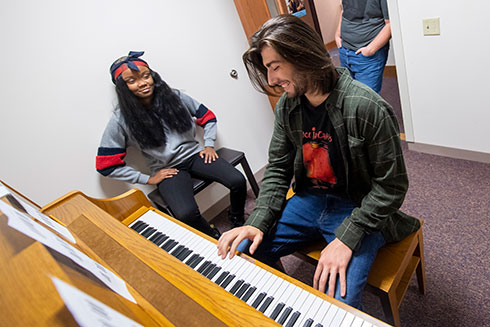Music program expands offerings to minor, pre-music therapy
Pep band, violin instructor added

With the addition of a music minor, the Pitt-Bradford has expanded its music offerings for students.
“We wanted to make sure that students don't have to give up music when they come to campus,” said Dr. Joshua Groffman, assistant professor of music.
In addition to the minor, students now have the option of playing in a pep band, pursuing pre-music therapy or taking new music classes.
The very first music minors were able to enroll last fall, and the program quickly gathered a handful without advertising.
“It has created a little community of people and made my job more fun,” Groffman said. “There's an esprit de corps now among the music students.”
Music had been the only subject in the university's interdisciplinary arts program that did not have a stand-alone minor. Minors already existed in art, theater and writing.
Students who minor in music will take 18 credits of music theory, history and performance and create a larger project over the course of a semester, such as a composition or performance.
One of the advantages of a small program, Groffman said, is that he can tailor this final project to whatever a student would like to pursue. “Tell us what you want to do, and we'll do what we can to make it happen,” he said.
To help students earn credits in performance, the music department started a pep band last year under the direction of Kathy Thumpston, who recently directed the Bradford Area High School Marching Owls. The pep band played at basketball games last year and may be able to play at more events this year. With the addition of a violin teacher, students can now take applied music lessons in classical guitar as well as voice, piano or organ.
There's an esprit de corps now among the music students.Dr. Joshua Groffman
Groffman's offerings for music history extend beyond the usual classical music fare. He has added a class the class Global Music Survey to introduce students to music they might not be familiar with and the class Music in Film to encourage students to think critically about music with which they are already familiar.
In the spring, he teaches an upper-level course on a specific genre or two. In 2019, those genres were hip hop and country - two of the genres students listen to most widely.
“We had some great conversations,” Groffman said. “It was so close to their lived experiences.” He worked with students to teach them how to talk about what it was they liked about specific pieces and to identify influences from other genres.
Groffman said he chose the two genres because they are both widely listened to by Pitt-Bradford students and maligned by segments of the broader culture. “If you ask people what they listen to, lots of them will say, 'Anything but rap or country.'”
Groffman was even able to broach the topic of racial stereotypes embodied in each genre. “Music moves across boundaries,” he said.
With the addition of a music minor, students who wish to break down barriers through music also will have a chance to pursue a pre-professional program in music therapy.
Music therapy students will major either in psychology with a minor in music or major in interdisciplinary arts with a minor in psychology to meet the curriculum requirements to pursue a master's degree in the growing field and be certified.
The field has a wide range of applications, including working with children, veterans, and those at the end of their lives.